|
|
|
Sort Order |
|
|
|
Items / Page
|
|
|
|
|
|
|
| Srl | Item |
| 1 |
ID:
122757
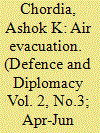

|
|
|
| 2 |
ID:
188452
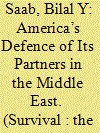

|
|
|
|
|
| Summary/Abstract |
The main factors American presidents typically consider before committing military resources to protect a partner include perceived US national interests, US domestic politics, the nature of the attack itself, the aggressor’s military capabilities and the possibility of escalation. An additional factor is the ability and willingness of the partner to conduct joint and combined operations with the United States and possibly others. This is critically important in the Middle East. As Washington prioritises the Indo-Pacific and Europe, US military forces will draw down in the Middle East and be less able to intervene promptly. To maintain strong regional deterrence, security arrangements between the United States and its Arab partners should be reconfigured to ensure that they can confront regional threats, Iran’s in particular, without immediate American assistance. The will require American advice and assistance in creating sustainable and effective joint forces.
|
|
|
|
|
|
|
|
|
|
|
|
|
|
|
|
| 3 |
ID:
104887
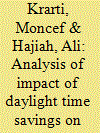

|
|
|
|
|
| Publication |
2011.
|
| Summary/Abstract |
In this paper, a detailed simulation-based analysis is conducted to assess the impact of adopting Daylight Saving Time (DST) on the electrical energy use and peak demand in Kuwait. The analysis focused on the impact of DST in the building sector since it represents 90% of electrical energy usage of Kuwait.
The simulation results indicate that the adoption of DST has mixed impacts for Kuwait. While the commercial and the governmental sectors may benefit from the DST, the private residences and apartment buildings can see both their annual energy use and peak demand increase slightly by adopting DST. The overall impact of the DST implementation is rather minimal with a slight increase energy use of about 0.07% and a slight reduction in peak demand of 0.14% or about 12 MW based on 2005 electrical peak demand for Kuwait.
|
|
|
|
|
|
|
|
|
|
|
|
|
|
|
|
| 4 |
ID:
106872
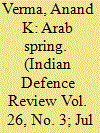

|
|
|
| 5 |
ID:
111603
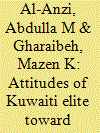

|
|
|
| 6 |
ID:
079657
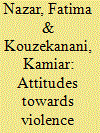

|
|
|
| 7 |
ID:
005325


|
|
|
|
|
| Publication |
New York, Linda Grey Bantam Books, 1992.
|
| Description |
xii, 530p.Hbk
|
| Standard Number |
05333089447
|
|
|
|
|
|
|
|
|
|
|
|
Copies: C:1/I:0,R:0,Q:0
Circulation
| Accession# | Call# | Current Location | Status | Policy | Location |
| 036524 | 923.573/SCH 036524 | Main | On Shelf | General | |
|
|
|
|
| 8 |
ID:
139127
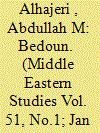

|
|
|
|
|
| Summary/Abstract |
The Bedoun (stateless/without nationality) in Kuwait constitute a controversial concurrent social, political and legal issue, which was and still is the subject of heated political debate, a vivid example of social conflict, and a platform of extensive legal deliberation concerning its thorny dimensions. The problem of Bedoun is not only politically and socially complex, but it has its problematic legal dimensions, which have made it, since the 1950s, a complex and chronic problem. The recent growing interest in addressing the issue and the extensive strife to determine its degree of complexity and entanglement could be ascribed to the margin of freedom enjoyed in Kuwait more than the rest of the Arabian Gulf states, since active social and political participation constitute the pillars of the democratic system in Kuwait, in light of the growing political and media freedoms and the focus on the Bedoun as a marginalized community legally, politically and socially. Therefore, the current problem ofBedoun constitutes the strongest internal concern for the Kuwaiti authorities and people after the external threats, especially because it has always been ignored or treated as a security issue at times. This study seeks to shed light on the issue of Bedoun to decipher its causes and its historical development until it became a pressing issue at government and community levels in the State of Kuwait. The study will avoid the complex legal and social complexities of the issue.
|
|
|
|
|
|
|
|
|
|
|
|
|
|
|
|
| 9 |
ID:
177207
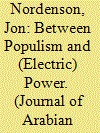

|
|
|
|
|
| Summary/Abstract |
Kuwait faces the double challenge of potentially destabilising effects of climate change as well as a changing international energy market in favour of renewables that may threaten the foundation of the oil-based economies dominating the region. Both these challenges point to the need for a transition towards more renewable energy sources and not least more sustainable patterns of energy consumption –– a transition that will be demanding for state and society alike. A successful green shift depends on a certain level of popular support or acceptance, yet it has proven difficult for the Kuwaiti government to gain support for their proposed solutions, and to reconcile the necessary changes with the existing relationship between state and society. This paper explores these challenges by studying public discourse concerning two contentious issues that are at the heart of the government’s economic reforms and of Kuwait’s planned efforts to cut GHG-emissions, namely fuel subsidy reform, and water and electricity conservation.
|
|
|
|
|
|
|
|
|
|
|
|
|
|
|
|
| 10 |
ID:
164397
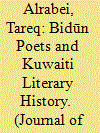

|
|
|
|
|
| Summary/Abstract |
This article examines the ways in which Bidūn (stateless) poets negotiate and contest their placement within dominant narratives of national literary history in Kuwait. The article offers an analytical overview of the dominant modalities in which national literary history in Kuwait has been conceived as it relates to questions of national beginnings, periodization and the placement of stateless poets. Read against the existing modalities, the article analyzes the Bidūn poet Saʿdiyya Mufarriḥ’s The Cameleers of Clouds and Estrangement (2007) as a revisionist account of national literary history that opposes the exclusion of Bidūn writers. This is achieved by an emphasis on the inclusivity of literary and cultural affiliation over the exclusivity of limiting notions of official national belonging. A critical analysis of the arena of national literary history writing in Kuwait aims to offer a novel perspective on how notions of national belonging are being renegotiated from the margins.
|
|
|
|
|
|
|
|
|
|
|
|
|
|
|
|
| 11 |
ID:
175141
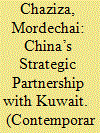

|
|
|
|
|
| Summary/Abstract |
In July 2018, the Kuwaiti Emir made a state visit of great significance to China, as both countries agreed to establish a strategic partnership creating new opportunities for Kuwait, which aspires to diversify its economy and seek investment opportunities. This study investigates various aspects behind the establishment of this partnership and examines the synergy between the Belt and Road Initiative (BRI) and the Kuwait Vision 2035 (KV2035) to understand the extent of economic engagement and relationship between the two nations. However, despite the considerable increase in Chinese trade and investments in Kuwait, some significant internal obstacles and external challenges remain to the successful integration of KV2035 with the BRI.
|
|
|
|
|
|
|
|
|
|
|
|
|
|
|
|
| 12 |
ID:
129664
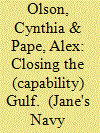

|
|
|
| 13 |
ID:
113056
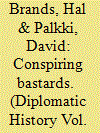

|
|
|
|
|
| Publication |
2012.
|
| Summary/Abstract |
This article uses captured Iraqi regime records to trace Saddam Hussein's strategic view of the United States from the time of his political ascendancy in the 1970s to his invasion of Kuwait in 1990. What is remarkable about Saddam's view of the United States is how consistently and virulently hostile it was. From early on, Saddam believed that the United States was unalterably opposed to his Baathist project and that Washington was seeking to marginalize and weaken Iraq. These sentiments were rooted in Baathist ideology and the key personality traits that shaped Saddam's worldview, but they were repeatedly reinforced by Washington's policies in the Middle East. Tacit U.S. support for Baghdad during the Iran-Iraq war aided Saddam's war effort but did little to ameliorate his fears. By the late 1980s and 1990, Saddam worried that American operatives were trying to assassinate him, and he saw the United States (and its ally, Israel) as the foreign powers most dangerous to his regime. This view of U.S. policy, in turn, seems to have had an important influence on Saddam's decision to invade Kuwait.
|
|
|
|
|
|
|
|
|
|
|
|
|
|
|
|
| 14 |
ID:
095609
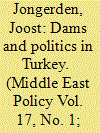

|
|
|
| 15 |
ID:
121474
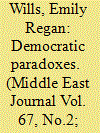

|
|
|
|
|
| Publication |
2013.
|
| Summary/Abstract |
The 1999 decree by Kuwait's emir granting women electoral rights, and its subsequent parliamentary rejection, is more than just an instance of women's oppression in action. It also demonstrates a potential paradox between two axes of democratization: liberalization, the existence of a sphere of meaningful public contestation, and participation, that the right to participate in that sphere is extended to all. In Kuwait, 1999 represents an instance where those two axes were in direct competition. This article explores the 1999 enfranchisement as a way of understanding this democratic paradox and then follows these issues through the successful 2005 enfranchisement and the election of female Assembly members in 2007 and in the 2012, post-Arab Spring elections.
|
|
|
|
|
|
|
|
|
|
|
|
|
|
|
|
| 16 |
ID:
166769
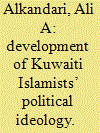

|
|
|
|
|
| Summary/Abstract |
This article aims to explore how the intellectual thinking and political actions of an Islamist could be developed and changed toward a more realistic view. The Kuwaiti Islamic Students’ movement in the UK was led by the youth of the Muslim Brotherhood under the Free Kuwait Campaign during the Second Gulf Crisis in 1990-91. This movement went through a significant development and change of ideas and practices with other political and societal groups. Dealing with all segments of Kuwait’s society as partners in the country and its destiny, and not as intellectual or party opponents, was the main change in ideas. Moreover, a qualitative leap in realistic political thought emerged among these young people and affected the future of the movement. In the immediate post-invasion era, this action was not invested towards building an open national platform. However, the students’ actions were influenced by the event, and pro Islam al-’i’tilafiyah became more accepting of others, leading to many students from other ideologies joining the ranks. Moreover, nationalistic ideas crept into Islamic thoughts in the post-invasion era, leading to a mixture of ideologies rendering one ‘moderate’ or ‘conservative’ that was described by stricter Islamists as ‘lenient’.
|
|
|
|
|
|
|
|
|
|
|
|
|
|
|
|
| 17 |
ID:
108258
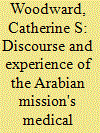

|
|
|
|
|
| Publication |
2011.
|
| Summary/Abstract |
In 1889 the pioneers of the Arabian Mission - a mission under direction of the Reformed Church in America - arrived in Arabia with the aim of Christianizing Muslims of the Najd and Arabian Peninsula. By the turn of the century, the missionaries were using medical knowledge and service as an interface for dialogue and evangelism. This article's aim is two-fold. First, it examines the history of the Arabian Mission and the history of medicine in the Gulf. Second, it explores the impact of the Americans on the Muslim communities from 1920 to 1960. To do so, it explores the experience of missionaries as well as the discourses missionaries constructed about Arabs and Arabia. It examines how the missionaries transcend the label of cultural imperialist, and how both the function and language of the missionaries evolved as oil wealth transformed the Gulf nations of Bahrain and Kuwait. This article, exploring the impact of the Arabian Mission from the late 1930s through 1960, continues the discussion published in the preceding issue of Middle Eastern Studies.
|
|
|
|
|
|
|
|
|
|
|
|
|
|
|
|
| 18 |
ID:
171484
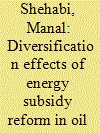

|
|
|
|
|
| Summary/Abstract |
For oil exporters, energy subsidy reform and economic diversification are critical policy responses to recent fundamental changes in the global oil market and oil price declines, yet the relationship between them is little understood. This article investigates linkages between energy subsidy reform and accelerating economic diversification away from hydrocarbons in a low oil price environment, using illustrations from Kuwait. It employs an economy-wide, general equilibrium model with oligopolistic industrial structure, the first of its kind for an economy in the Middle East and North Africa, that embodies unique elements of the country's economic structure—oil dependence; public sector dominance; subsidies; sovereign wealth funds; industrial collusive pricing behaviour; and guest workers. The article argues that, contrary to common popular discourse, Kuwait's economy has a diversified economic base, but this base fails to diversify export or government revenue needed for economic sustainability. Results show that weak economic diversification in oil exporters with a similar economic structure is not primarily due to “Dutch disease,” as dominant in the literature, but to economic constraints and distortions that impair structural change and exacerbate overdependence on hydrocarbons. Labour and competition reforms relax some constraints, achieving large efficiency gains that extend economy-wide and can expand non-energy tradable sectors. The analysis has important policy implications. First, the potential role of pricing regulation in small economies in moderating economic impacts of negative oil shocks. Second, in oil economies characterized by pervasive oligopolies, microeconomic reform can be a channel to achieve efficiency and better diversification effects of subsidy reform.
|
|
|
|
|
|
|
|
|
|
|
|
|
|
|
|
| 19 |
ID:
177398
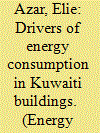

|
|
|
|
|
| Summary/Abstract |
Understanding and quantifying the drivers of energy consumption in buildings is an essential step to identify inefficiencies and guide energy conservation efforts and policies. While such efforts are common in western countries, they remain limited in the Middle East and North Africa (MENA) region, particularly in the State of Kuwait. This article presents the first systematic assessment of the drivers of energy consumption in Kuwaiti commercial and residential buildings. It presents a unique hybrid study approach combining data collected from 463 buildings with Building Performance Simulation (BPS) developed and validated to mimic the performance of archetype (i.e., typical) Kuwaiti buildings. Results identify the built-up area and the thermostat cooling setpoints as the main determinants of electric consumption, quantifying the exact relationships between these variables. For instance, a simple 2 °C increase in the thermostat cooling setpoint can lead to a more than 10% reduction in total energy use. Other parameters that are typically known to affect building performance, such as the type of Air Conditioning (AC) systems installed, did not show statistically significant effects. The findings helped derive important recommendations for the Kuwaiti authorities, covering the educational, technological, and policy-related dimensions of the challenges facing the building sector.
|
|
|
|
|
|
|
|
|
|
|
|
|
|
|
|
| 20 |
ID:
128213
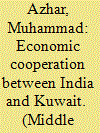

|
|
|
|
|
| Publication |
2014.
|
| Summary/Abstract |
Over two decades of liberalization and reforms have resulted in India becoming the second fastest growing economy in the world. Having the second largest population in the world, it is also a vast repository of skilled manpower. However, the significant growth in Indian economy has increased the demand for energy substantially. Consequently, India has to import 80 per cent of its petroleum crude requirement. In contrast to India, Kuwait is very small in size and population. But it is very rich in hydrocarbon resources. The economic cooperation between India and Kuwait is deep rooted. It consists of bilateral trade inclusive of energy imports, Indian expatriate workers in Kuwait and the inflow of remittances, Kuwaiti aid and prospective Kuwaiti investments. The article is a detailed study of all these aspects of economic cooperation between the two countries.
|
|
|
|
|
|
|
|
|
|
|
|
|
|
|
|
|
|
|
|
|